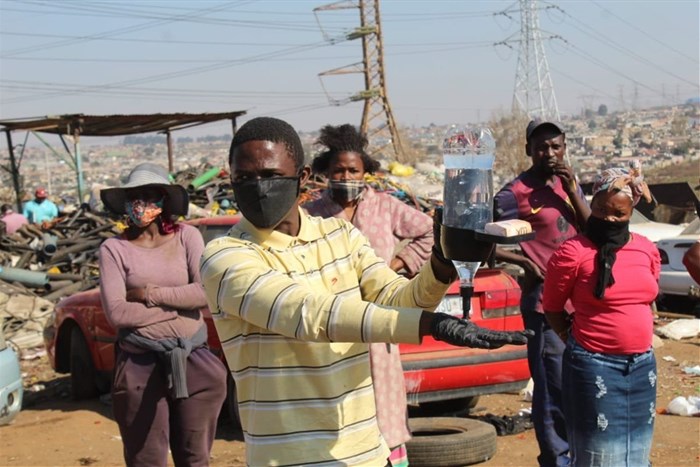
Top stories






More news














The effect of Covid-19 and lockdown on children and youngsters have been a case for debate and study, from lack of access to data or devices for online learning to the mental health issues. It has also stirred many sectors not to "go back to normal” but to "build back better"(#BuildBackBetter) by mobilising resources, tackling inequality and improving infrastructure.
"Our sector as a whole has been agile in its response to Covid-19, especially with food relief, and access to water and sanitation,” says Jane Molony, executive director of PAMSA, adding the sector has been operating since Level 5.
"In honour of Youth Day 2020, we wanted to share some of the great work that our members has been doing for younger generations."
The Abashintshi - an isiZulu word meaning the 'changers' - are a group of enthusiastic youngsters who have received community development training through Sappi over past few years. Trained to facilitate social mobilisation and behaviour change, the Abashintshi are using their influence to spread information about the coronavirus and Covid-19. Sappi Southern Africa has produced a useful set of illustrated messages to support their social media efforts.
The messages - in English and isiZulu - deal with personal hygiene, social distancing, how to wear and care for masks, how to identify Covid-19 symptoms, how to self-isolate and how to cope with stress and anxiety.
"Normally they would be arranging the Sappi-sponsored school holiday programmes to keep youngsters entertained, but the lockdown has disrupted these plans," says Mpho Lethoko, Sappi Southern Africa communications manager. "Instead, they are using their peer influence to inform communities about Covid-19 using technology."
Ntando Sawoni, an umshintshi in the Njavini community has been creating awareness around Covid-19 to her close friends, community members and church groups. "I am very pleased that I have seen a change in their behaviour. People are using masks correctly which is important as the economy slowly opens up. It is great to see Covid-19 infographic posters put up in tuckshops around my area."
Mondi has partnered with Ligbron Academy of Technology since 2019 to address STEM educational gaps in rural communities through e-learning. The NGO uses technology to improve the quality of teaching and learning of science, technology, engineering and maths, two subjects which are key in the pulp and paper industry.
With the help of Mondi, Ligbron has equipped Grade 11 and 12s in four rural KwaZulu-Natal schools with e-learning systems along with free access to e-books. Data access and costs are an obstacle for many learners. Principals went out of their way to help learners download e-books to their phones. Some even went to fetch learners’ phones, while Ligbron ensured that they had Internet access.
PAMSA and the industry’s producer responsibility organisation Fibre Circle have also been reaching out to communities around the country and the Ekurhuleni region.
"Informal waste collectors and their families took a financial knock when they were not allowed to operate under Level 5 regulations," notes Molony.
Molony adds that the paper industry partnered with Packaging SA members and other producer responsible organisations and the Department of Forestry, Fisheries and Environment (DFFE) to help alleviate their plight. Some 8000 collectors to date have received food vouchers valued at R200 each. DFFE regional offices, the African Reclaimers Organisation and the Waste Pickers Association of South Africa facilitated the supply of names and phone numbers as did buy back centres and producer responsibility organisations.
"Vouchers are still being distributed via mobile phones as funds come through Fibre Circle," says Francois Marais, Fibre Circle manager, who adds that tax exemption is available on donations as it is a registered public benefit organisation.
"With the support of industry partners, corporate sponsors and our members, we were also able to deliver food parcels, as well as provide cloth masks. Fibre Circle and PAMSA also distributed Business For South Africa (B4SA) donations of water, soap and hand-washing facilities in informal settlements," explains Molony who has also been acting as B4SA Covid-19 Water Lead.
Fibre Circle has also purchased 3,000 books from Book Dash for distribution to children of waste collectors in Johannesburg, Durban and Cape Town, with the assistance of Mpact Recycling and its buy-back centres.
Earlier this year, Mpact Recycling launched its 2020 schools recycling competition in partnership with Butterfly Products. Schools in Gauteng, KwaZulu-Natal and the Western Cape stand a chance to win a share in prizes and stationery to the value of R220,000.
Terms & conditions apply, and rules vary between provinces.